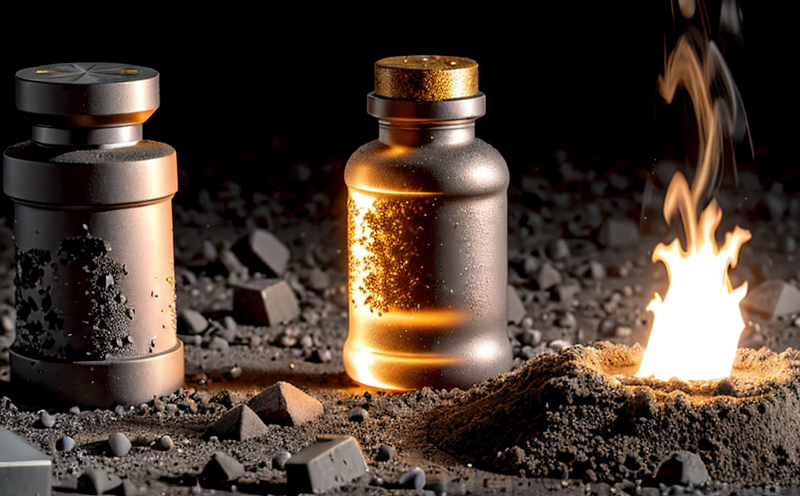ISO 11846 SCC Testing in Irradiated Aluminum Alloys
The ISO 11846 SCC (Scallop Crystal Cracking) testing method is a critical tool used to assess the susceptibility of irradiated aluminum alloys to radiation-induced material degradation. This service is essential for ensuring that materials used in high-radiation environments, such as nuclear reactors and space structures, maintain their integrity over long periods.
The process involves exposing specimens made from specific aluminum alloys to gamma or electron beam irradiation. Following exposure, the samples undergo detailed inspection using advanced optical microscopy techniques. The primary focus is on identifying scallop crystal cracking—a form of radiation-induced damage that can weaken materials and lead to catastrophic failure under stress.
This testing method is particularly relevant for sectors where high-integrity components are crucial, such as aerospace, nuclear power generation, and defense industries. By understanding the extent and nature of SCC, engineers can optimize material selection and design strategies to enhance durability in harsh radiation environments.
The ISO 11846 standard provides a standardized approach to conducting this testing, ensuring consistency across different laboratories worldwide. This standardization is vital for maintaining high-quality standards and facilitating international collaboration between researchers and industry professionals.
For quality managers and compliance officers, understanding the implications of radiation-induced material degradation is crucial. By leveraging ISO 11846 SCC testing, they can ensure that their organizations comply with stringent regulatory requirements and maintain a competitive edge in the global market.
R&D engineers benefit greatly from this service as it allows them to explore new materials and processes without compromising safety or performance. The insights gained from such testing can lead to innovations that improve product reliability and extend operational lifetimes. For procurement teams, selecting suppliers who offer ISO 11846 SCC-tested materials ensures that they are investing in products that have been rigorously evaluated for their ability to withstand radiation-induced damage.
The significance of this service extends beyond just compliance; it plays a pivotal role in advancing the field of nuclear engineering and material science. By continuously improving testing methods, researchers can push the boundaries of what is possible in terms of materials performance under extreme conditions.
Why It Matters
The importance of ISO 11846 SCC testing cannot be overstated, especially when considering its impact on safety and reliability in critical applications. In sectors like nuclear power generation and aerospace, where even minor failures can have catastrophic consequences, the integrity of materials is paramount.
- Enhanced Safety: By identifying potential weaknesses caused by radiation-induced material degradation, this testing helps prevent accidents that could result from compromised structural components.
- Improved Reliability: Ensuring that materials can withstand high levels of irradiation over extended periods is crucial for maintaining consistent performance and longevity in demanding environments.
- Regulatory Compliance: Adherence to international standards like ISO 11846 not only demonstrates commitment to quality but also ensures compatibility with global regulations governing nuclear and aerospace industries.
The ability to predict and mitigate the effects of radiation-induced material degradation through comprehensive testing is key to advancing these fields. It enables stakeholders to make informed decisions that balance cost, performance, and safety effectively.
Benefits
- Predictive Insights: Provides detailed information about the susceptibility of materials to radiation-induced damage, allowing for proactive measures against degradation.
- Informed Decision-Making: Enables engineers and researchers to select appropriate materials based on their proven resistance to radiation-induced material degradation.
- Enhanced Safety: Identifies potential risks early in the development process, minimizing the likelihood of failures that could lead to accidents or injuries.
- Cost Efficiency: By preventing premature failure and extending service life, this testing helps reduce maintenance costs and improve overall operational efficiency.
The benefits extend beyond just technical improvements; they also contribute to environmental sustainability by promoting the use of longer-lasting materials that require less frequent replacement. This aligns with broader goals aimed at reducing waste and conserving resources.
International Acceptance and Recognition
- ISO 11846 Standardization: The ISO 11846 standard ensures that SCC testing is conducted consistently across different laboratories, enhancing reliability and comparability of results.
- Global Collaboration: By adhering to this standard, organizations can participate in international research projects and share knowledge with leading experts worldwide.
The widespread adoption of ISO 11846 SCC testing underscores its importance in the global community. Its acceptance by major nuclear and aerospace entities highlights its value as a robust tool for assessing radiation-induced material degradation.





